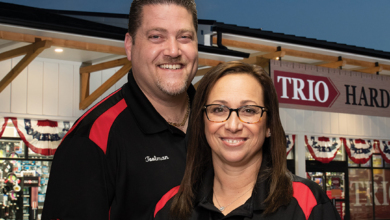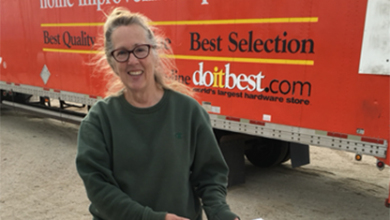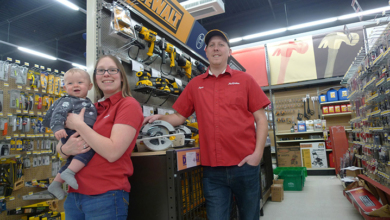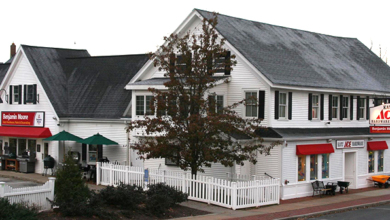Beacon Award for Community Service —Wholesale Lumber Company – Clint, Texas
By Chris Jensen

Determined to come out of this pandemic as a stronger retailer, Joe Burks concludes that it’s all about planning, protecting the community and building trust. “It’s nice when your morals and business goals fall into sync without need for adjustment of either,” he says. “If customers and employees do not feel safe, it is going to have long-term consequences.”
Burks and his wife Jody operate Wholesale Lumber Company in Clint, Texas, plus a second store six miles away in Fabens, Texas. His mother, Alma, owns the family’s original store in Socorro, which is managed by his younger sister, Jerri Burks.
Jody, a retired fifth-grade math and science teacher, makes sure their customer service stays up to par. That has been more of a challenge during the pandemic.
Joe made an educated guess early on that the coronavirus was here to stay for a while, and he wasted no time taking decisive action. “I started researching early and before we even had a case in El Paso, we had employees wear face masks,” he says.
Around the time El Paso had its first case of COVID-19, they hired a full-time cleaning person dedicated to a continuous loop of disinfecting the high-use areas of the store. They intend to continue doing that even when the pandemic ends. “Having a clean store always makes an impression,” Joe says.

The Do it Best member started employee temperature self-checks, limited the break room to one occupant, installed a hand wash station at the store front, put in social distancing signage and floor markings, installed plexiglass shields at the cash registers, started keeping cash registers manned all the time and required all employees to wear cloth masks.
Joe and Jody also revisited their sick leave policies and prohibited sick employees from coming in, making sure everyone knew the consequences for doing so.
“Our staff is definitely uneasy about all these changes—it’s a lot to take in—but I made a point not to sugarcoat things. I worry for myself, my employees and the community,” says Joe, who holds weekly meetings with their 21 employees to keep them informed of updated policies.
On the planning side, they updated their employee manual, added authorized signers on accounts, added to the pool of store key holders, started some cross training between jobs and wrote out an informal document of emergency “what ifs” to share with the staff.
“When our first county stay-at-home order came out, we blocked half of our parking spots to limit peak traffic in the store and allowed only one person per vehicle in the store,” reports Joe. “During the biggest rush we had a person at the gate to let in one car at a time and would have 15 cars on the road waiting to get into the lot. It is much nicer having customers wait in line in their air-conditioned cars than elbow to elbow on the sidewalk.”

MASKING UP
On the first day the CDC recommended the wearing of cloth masks, Wholesale Lumber Co. made them mandatory for everyone coming into the store.
Joe had already spent several weeks gathering materials for masks. He had two ladies volunteer to make 1,000 cloth masks. They also came up with a low-tech mask made out of a blue shop towel, two rubber bands and four staples—several thousand of those were made. They set up an area to sanitize and then bag the homemade masks.
“It is by no means an N95 mask, but some sources claim that as a nonwoven fabric it is superior to cloth,” he says. “And if nothing else, it does make a swell dust mask for those customers who still need those.”
While the vast majority of their customers have been understanding of the need to wear masks, Joe says it’s easier to manage if you can hand them one.
“With the level of service expected in a hardware store, social distancing can be hard on the sales floor. That customer who comes in holding a plumbing part still needs you to get close enough to look at it and tell him what he needs. I still stay on my crew about keeping their distance, but I think the cloth masks add an extra layer to that,” he adds.
With safety protocols in place, Wholesale Lumber has found another way to make a difference in the community during the pandemic. “We’re going to do some small business grants to help make local businesses safer, supplying them with materials to handle a pandemic like sneeze guards. If you’re down to 25 or 50 percent capacity you’re probably not investing in projects like this, so there’s a need,” Joe says.

ADJUSTING TO THE NEW NORM
Burks began working in the family business at the age of 10, and he is proud to carry on his father’s legacy. He is also trying to live up to the high standards set in the Clint store by his sister, Tina Bearden, who used to run that store before she passed away in March 2017 after a long illness. “She never met a stranger and brought out the good in everyone she met,” Joe says.
Joe enlisted the help of Do it Best to give the Clint store a major facelift, spending 2018 remodeling the 45,000-square-foot facility. The space devoted to hardware doubled to 18,000 square feet, which proved fortuitous when the pandemic created previously unseen demand for products.
“The remodel has put us in a much better position,” says Joe. “It widened aisles and gives a better flow of traffic. We’re getting ready to remodel the Fabens store and we may rethink a few things based on what’s happened during the pandemic.”
According to Joe, business is absolutely exploding—up 57 percent in the second quarter. “It’s terrible to not want more business, but we’re at capacity now. Things are finally starting to calm down, but we had some growing pains,” he says.
Now, the biggest challenge is finding enough lumber. “We’re in a low-income area and have people building their own house,” he explains.
Do it Best has never been more of an asset to his business, Joe says, giving the Clint store the right upgrade and keeping his stores supplied during a pandemic.
Burks says they are honored and humbled to win the Beacon Award for Community Service. “We’ve always been community-oriented. It’s really nice to be noticed that I was on the ball and started early while others were in denial about the virus,” he says.









